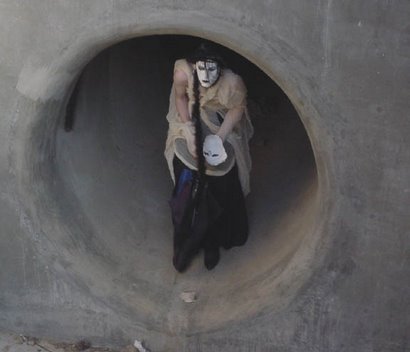I finished Amsterdam last night, and it’s certainly vintage McEwan. In Amsterdam, McEwan conjures up base emotion to make this novel disturbing in its all-too-humanness, in how every pen-stroke is a blow to the main characters and an indictment against those who watch. What's intriguing in his writing isn’t so much the outcome – the outcomes are generally predictable in their very essence. Rather, it’s the writing’s fatalistic arc, how the characters are seemingly resigned to / controlled by their fate. While McEwan may not write with determinism in mind, it's a central theme in his major works. Even though Amsterdam is presented in third person, the prose is filtered through each character’s thought process, leaving the reader believing that it had to happen this way. McEwan convinces the reader that his story, his interpretation of events is the only correct one and that the (sparse) details he provides is all that's necessary.
I apologize for the ambiguity, but I don’t have the volume in front of me plus I don’t want to reveal too much.
Received back issues of Caketrain 2 & 3 yesterday. I gave the poetry a skim in each, and there are several big names and excellent pieces throughout. One observation (and I’m striving for objectivity here) is that Caketrain 4 is the most experimental of any issue. Yes, there are “experimental” pieces in every issue, but issue 4 seems less intent on fulfilling a narrative poetry quota (not that I have anything against narrative poems a priori) and more intent on forcing the reader upon strange realities. Maybe this young journal is now comfortable in its britches. If you have a spare $20, I’d encourage you to pick up a couple issues of Caketrain; it’s definitely a journal intent on publishing innovative writing.
Even though my Thursday evenings are free, it’s the most difficult day of the week for me to write. After four days of work and two nights of classes, I just want to watch basketball, read something non-philosophical, or play Civilization IV. Plus, I’m pretty confident I’ve finished Palsy Aria, at least insofar as I’m done explicitly exploring its themes, so I’m still searching for my next project. No, I’m not writing with another (chap)book in mind or suggesting that any collection or series of poems should have a narrative arc that unifies everything. I just like to write with a cohesive, abstract theme guiding me. I have some ideas, but I need something to grab me.
I wish WV wasn’t a literary cesspool.
-j

Friday, February 9, 2007
Subscribe to:
Post Comments (Atom)

4 comments:
Hi -
I read Amsterdam a couple years ago and it was the most disappointing of McEwan's novels in my opinion. In fact I swore him off afterwards. I found it very contrived and the far-fetchedness of it irked me. Of course his writing is terrific. I gave into reading him again, though, when my mother left a copy of "Saturday" here at Christmas. It was better, if still a little easy. Nevertheless, his prose is a wonder.
nice to see you blogging.
cheers, sarah
Sarah,
I know what you mean. The ending of Amsterdam was definitely telegraphed, but I still enjoy the prose, which is top notch like you mention. I try to focus on everything else going on in the text: the secondary-character's motives, why does he include this or that detail, etc. I thought Enduring Love and The Comfort of Strangers were far less telegraphed (and I would have preferred the latter get recognition). I can relate though as McEwan rarely writes a book / story where the ending is a complete mystery (or happy). You just have to be comfortable with the journey.
Do you read any other good "fiction" writers? I read DeLillo and have vowed to pick up a Pynchon novel soon. And The Road by McCarthy. I've found that reading a good book of fiction makes it easy to digest 3 or 4 books of philosophy in a row. Any suggestions would be much appreciated.
I swear I'll add a blogroll soon, and I'll link to you.
My best,
-j
You should definitely read John Banville. Excellent prose. Better than McEwan. And the plot is secondary.
Thank you Sarah. I will look into your suggestion!
-j
Post a Comment